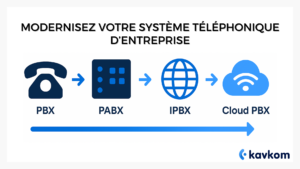Heralded as dying with the rise of new technologies and the development of artificial intelligence, business telephony has taken many by surprise. This field has been able to identify the expectations of a public increasingly in need of human contact in customer relations. New communication channels, the evolution of e-commerce, more complex itineraries – all these potential obstacles have turned into a springboard for a discipline that is far from being at the end of its life. However, before opting for an IP telephony solution, it’s essential to understand all the ins and outs.
Discover the advantages, specific needs and selection criteria of IP telephony for businesses in detail in our dedicated article.
What should you consider before deploying IP telephony?
A business strategy based on an IP telephony solution needs to be thought through in detail, upstream of the project. Finding the most suitable option can’t be improvised. Companies looking to expand must be able to project themselves into this new way of communicating with their customers. It starts by questioning your habits, as well as your more or less long-term goals:- What role will IP telephony play in the company’s sales strategy? Will it be a supplementary medium designed to relieve sales agents of certain tasks, or a comprehensive tool designed to massively expand business?
- what will be the main roles of this communication channel: the aim here is to determine whether the company primarily wishes to build loyalty among its core clientele, canvass a wider panel of consumers, or multiply sales exponentially?
- how many people will be directly affected in their work by this internal change: does this factor determine the size of the installation, the equipment required or the general organization of the teams?
- are the people involved trained: some solutions are comprehensive and therefore complex. It’s in the company’s interest to integrate the level of training of its personnel into its career development?
- what are the targeted results in the short, medium and long term: by quantifying these data, it’s easier to determine which options are useful for the company?
Focus on technical specifications for IP telephony
IP telephony is much more than just the digitization of customer service. It provides an appropriate, customized solution for every company. The aim of these new systems is to relieve the workload of sales agents, who can then concentrate on their sales mission, but it goes far beyond this simple service. The aim is to create a link with customers who are often looking for more human contact with the companies in their daily lives. So, in concrete terms, what technical specifications for IP telephony can be decisive in a company’s development?- an answering machine and wrong number detector,
- better queue management: timing is a decisive factor with consumers,
- automatic dialing,
- the click-to-call option: when the customer has a choice and can ask to be called back, this can easily generate a sale, on the customer’s initiative,
- call recordings,
- an unlimited subscription,
- guaranteed interference-free calls: thanks to new communication channels, call quality has been optimized. For teams, this means greater efficiency,
- no maintenance costs: telephony via the cloud requires no hardware installation. With everything digitized and outsourced, maintenance costs are a thing of the past,
- greater availability for employees, even when they’re on the move: when a simple Internet connection is all that’s needed to be up and running, the range of possibilities for sales teams expands exponentially,
- fully outsourced management.
To learn more about the different types of IP telephony servers, their role, operation and selection criteria, read our detailed article.
What associated costs need to be taken into account?
For a company, switching to IP telephony generally means a significant reduction in costs. In fact, opting for a digitized solution cuts many costs, such as the purchase of equipment and various maintenance and repair costs. However, the budget needs to be thought through in advance. Certain associated costs are not always taken into account by professionals when choosing their IP telephony solution:- commissioning costs, which vary from one service provider to another,
- the billing method can modulate the allocated budget,
- any additional options, which may generate extra billing.
The company’s specific needs
The greatest advantage of IP telephony lies in its ability to adapt to the specific needs of each company. By doing so, your service provider can offer you a perfectly relevant solution that meets your expectations. It would be pointless to imagine a one-size-fits-all offering, given the wide variety of objectives, budgets and operating methods.Sales agents
IP telephony provides a real answer to the major problem faced by sales agents: lack of time! Many time-consuming tasks can now be outsourced to IP telephony. It’s essential to assess the needs of each team, so that this transition truly supports their work and enables them to optimize their efficiency.- quick import of prospect lists,
- real-time database modification,
- file follow-up,
- precise statistics, by group or agent,
- writing dated comments,
- call conversion.
The company
Just like its teams, the company faces many challenges. Learning to define your real needs enables you to plan a suitable IP telephony solution.- lower costs,
- the company is freed from the constraints of equipment upkeep and maintenance,
- sales agent performance is analyzed in detail,
- fully outsourced infrastructure,
- personalized support.
Our customers
Sometimes the company is looking to reconnect with a declining customer base, but more often than not, IP telephony is used to :- increase overall satisfaction,
- reduce waiting times,
- speed up processing time for requests and orders,
- improve the company’s brand image.





